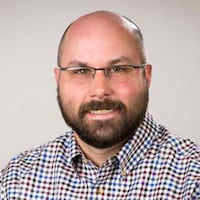LeCrone was across the street from the Horizon League office that has been his professional home since the summer of 1992. The topic was conference instability on a national scale and what that could mean for leagues like his, which have found membership balance (10 schools) but have attractively successful programs (Butler).
“It’s not exceptionally different,” he said, “from when I took this job.”
In his 20th year as the Horizon League commissioner, the fifth-longest tenure among Division I conference leaders, the Vandalia native has tweaked, twisted, maneuvered and, ultimately, stabilized the Horizon League into a group consistently ranked among the top 10 non-power conference men’s basketball leagues in the country.
With conference instability throughout the highest levels of college sports, commissioners like LeCrone are paying close attention, wondering what effect those moves could have on their leagues. Because of its basketball success, Butler has been mentioned as a possible addition to a larger conference.
But movement is nothing new to LeCrone, as the Horizon League has as many former basketball playing members (10) as current members. Its history includes the largest non-merger addition of schools in college sports history, when six, including Wright State, joined in 1994.
LeCrone said he is comfortable with the current 10-school lineup because of the institutions’ similarity and proximity. Others say the man who led the formation of that group is the right one to be in charge.
“He’s a tremendous visionary, always thinking outside the box,” said Bob Grant, the Wright State athletic director. “He’s also a really, really strong consensus-builder. With 10 schools, you have 10 sets of problems and leaders. He’s great at finding common ground for all of us.”
Finding stability
The Horizon League was founded in June 1979 as the Midwestern City Conference with six members: Butler, Loyola, Evansville, Oklahoma City, Oral Roberts and Xavier. It changed its name to the Midwestern Collegiate Conference in 1985, but by the early 1990s the collection of private schools was unstable.
LeCrone was an assistant commissioner in the Atlantic Coast Conference in charge of football, working for his mentor, former ACC commissioner Gene Corrigan. In the summer of 1992, Corrigan called LeCrone while he was on a business trip and asked him to consider the commissioner opening. After meeting twice with the search committee, LeCrone took the job and entered a sometimes-uncomfortable setting of schools with a mix of financial difficulty and unhappiness with the league. Within a year, Dayton, Duquesne and Evansville announced they would leave.
On Dec. 9, 1993, LeCrone announced that Cleveland State, Wright State, Illinois-Chicago, Northern Illinois, Wisconsin-Milwaukee and Wisconsin-Green Bay would join the next summer, giving the league nine members. But LeCrone’s goal was always 10 schools.
After Northern Illinois departed, Youngstown State was added in 2001, and Valparaiso joined in 2007.
“Which I think is the absolute perfect number,” LeCrone said. “Ten.”
Taking on challenges
College basketball practices began on Friday as the Horizon League prepares to begin its fifth year as a 10-school conference. It has produced multiple NCAA tournament teams in two of those seasons, and Butler’s appearances in consecutive NCAA tournament championship games are well-known.
The concerns moving forward, LeCrone said, are maintaining the membership stability and helping the schools succeed financially. That’s a different challenge in a league without basketball, which draws less lucrative and shorter-term media rights contracts.
“When you have a basketball-only league, your rights fees are substantially smaller and sometimes even substantially smaller in terms of length,” LeCrone said, drawing out the word “substantially.” “Our ESPN contract this last year we just signed was three years with a one-year option. If you look at the new media rights deals with big football schools that include basketball, they’re 10, 11, 12, 13, 14 years. The reason those are getting locked in is because of football.”
Many have wondered if Butler’s success would cause other leagues to recruit the Bulldogs. LeCrone said a conference “has never been about a single institution or two.”
Butler, which resides in the same city as the league offices, is a charter member of the league.
“We’re focused on the Horizon League and taking strides to try to market what is a really good product,” Butler coach Brad Stevens said. “Any time a product is better than its reputation, there could be some different efforts to help people realize what you have. We have a great product, and we’re hoping to continue making it good.”
That’s what LeCrone is hoping as well. With no clear league favorite and few returning stars, league observers say this should be a highly competitive season for men’s basketball. It just took 15 years to reach this grouping.
“The glue is number, values, stability, proximity,” LeCrone said. “It’s taken some time, I’ve been here 20 years, but we’re in a great place.”
Contact this reporter at (937) 225-7389 or knagel@DaytonDailyNews.com.
About the Author
